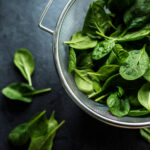
In this article
overview
Heartburn can be a persistent and uncomfortable problem, disrupting daily life and even sleep. While it’s well-known that certain foods can trigger heartburn, did you know that there are specific foods that can help alleviate it? Let’s explore a variety of foods that can help combat heartburn and improve digestive health, while providing some practical advice on how to incorporate them into your diet.
Understanding Heartburn and Its Triggers
Heartburn happens when stomach acid flows back into the esophagus, leading to a burning feeling in the chest or throat. This can be triggered by various factors, including the consumption of specific foods and drinks. Common culprits include coffee, chocolate, tomatoes, and fatty or spicy foods. However, not all foods are bad news for heartburn sufferers. In fact, some can help soothe and prevent the discomfort.
Key Foods to Combat Heartburn
Low-Acid Foods
When managing heartburn, choosing low-acid foods is crucial. These foods can help minimize the acid that irritates the esophagus.
- Melons and Bananas: Most fruits are acidic, but melons and bananas are exceptions. These fruits are gentle on the stomach and provide a nutritious snack option.
- Oatmeal: Starting your day with oatmeal can be beneficial. It’s filling, high in fiber, and doesn’t cause reflux.
- Whole-Grain Bread: Opt for whole-grain bread made with unprocessed grains. Unlike refined grains, whole grains retain their natural fiber and nutrients.
- Brown Rice and Couscous: These complex carbohydrates are great for those with reflux, offering more fiber and nutrients compared to white rice.
- Green Vegetables: Broccoli, asparagus, green beans, celery, and cauliflower are low in acid and rich in nutrients.
Lean Proteins
Including lean proteins in your diet can help manage heartburn by providing essential nutrients without the added fat that can trigger symptoms.
- Chicken and Turkey: These can be grilled, broiled, baked, or steamed. Remove the skin and avoid frying.
- Lean Beef: Choose lean cuts of beef and prepare them without added fats.
- Fish: Grilled, poached, or baked fish are excellent choices. Avoid frying or using fatty sauces.
- Egg Whites: Low in acid and a good source of protein, egg whites can be a heartburn-friendly option.
High-Fiber Foods
Fiber can help you feel full and prevent overeating, which can exacerbate heartburn. Incorporate these fiber-rich foods into your diet:
- Root Vegetables: Sweet potatoes, carrots, and beets are excellent sources of fiber.
- Whole Grains: Foods like oatmeal, brown rice, and couscous are high in fiber and can help prevent reflux.
- Green Vegetables: Asparagus, broccoli, and green beans are not only low in acid but also high in fiber.
Alkaline Foods
Foods with a higher pH can neutralize stomach acid and reduce reflux symptoms. Include these alkaline foods in your diet:
- Bananas and Melons: These fruits are not only low in acid but also have an alkalizing effect.
- Cauliflower and Fennel: Both are low in acid and provide a range of health benefits.
- Nuts: A small handful of nuts can be a heartburn-friendly snack option.
Watery Foods
Foods with high water content can dilute stomach acid and help prevent heartburn:
- Celery and Cucumber: These crunchy vegetables are low in calories and high in water content.
- Lettuce and Watermelon: Both are hydrating and can help soothe the digestive system.
- Broth-Based Soups and Herbal Tea: These liquids can help dilute stomach acid and provide relief from symptoms.
Natural Remedies and Herbal Options
Beyond food, certain herbs and natural remedies have long been used to treat digestive issues, including heartburn.
- Fennel: This crunchy vegetable with a mild licorice flavor can improve digestion and reduce acid reflux.
- Ginger: Known for its digestive properties, ginger can help soothe the stomach and reduce reflux.
- Parsley: Often used as a garnish, parsley has been a traditional remedy for digestive issues for centuries.
- Aloe Vera: Aloe vera juice can help soothe the esophagus and reduce inflammation. Ensure you choose products free of anthraquinones, which can irritate the digestive system.
Foods to Avoid
To effectively manage heartburn, it’s equally important to avoid foods that can trigger symptoms. These include:
- Fried and Fast Food: High in fat and difficult to digest, these foods can exacerbate heartburn.
- Tomato-Based Sauces and Citrus Fruits: Both are highly acidic and can irritate the esophagus.
- Chocolate and Peppermint: These can relax the esophageal sphincter, allowing acid to escape from the stomach.
- Carbonated Beverages: These can increase pressure in the stomach, promoting acid reflux.
Practical Tips for Managing Heartburn
Implementing a heartburn-friendly diet involves more than just choosing the right foods. Consider these tips for better management:
- Eat Smaller, Frequent Meals: This can prevent the stomach from becoming too full and reduce the likelihood of reflux.
- Avoid Late-Night Eating: Give your stomach time to digest before lying down by eating your last meal at least three hours before bedtime.
- Stay Upright After Meals: Sitting or standing after eating can help keep stomach acid where it belongs.
The Takeaway
Managing heartburn involves a combination of dietary changes and lifestyle adjustments. By incorporating low-acid, high-fiber, and alkaline foods into your diet, and avoiding known triggers, you can reduce the frequency and severity of your symptoms. Remember that individual responses to foods can vary, so it may take some experimentation to find what works best for you. If heartburn persists, consult a gastroenterologist for personalized advice and treatment options.
Start making these dietary changes today and take control of your heartburn for a more comfortable and enjoyable life
A Quick Review
Heartburn occurs when stomach acid backs up into the esophagus, causing a burning sensation. Certain foods can help alleviate heartburn symptoms, such as low-acid fruits, whole grains, lean proteins, and watery foods. Incorporating these foods into your diet can provide relief and prevent future occurrences, offering a natural way to manage heartburn effectively
Frequently asked questionsay
What foods help alleviate heartburn?
Low-acid fruits like melons and bananas, whole grains, lean proteins, green vegetables, and watery foods like celery and cucumber can help alleviate heartburn.
What foods should be avoided to prevent heartburn?
Avoid fried and fatty foods, tomato-based sauces, citrus fruits, chocolate, peppermint, and carbonated beverages to prevent heartburn.
How can ginger help with heartburn?
Ginger is known for its digestive properties and can help soothe the stomach and reduce acid reflux due to its anti-inflammatory and alkaline nature
Can aloe vera help with heartburn?
Yes, aloe vera juice can help soothe the esophagus and reduce inflammation, but ensure it’s free of anthraquinones, which can irritate the digestive system.
What lifestyle changes can help manage heartburn?
Eating smaller, frequent meals, avoiding late-night eating, and staying upright after meals can help manage heartburn.











